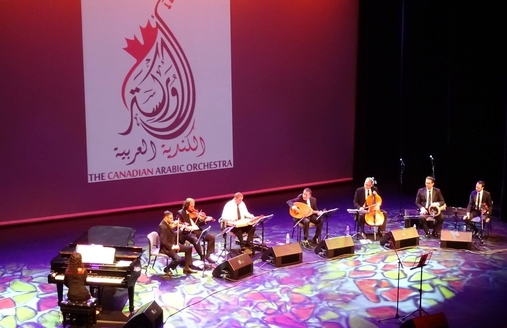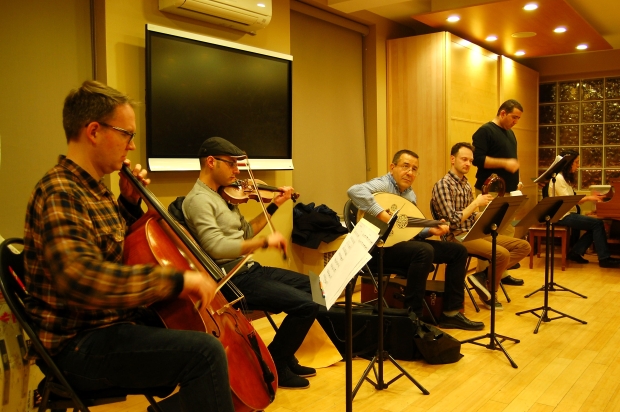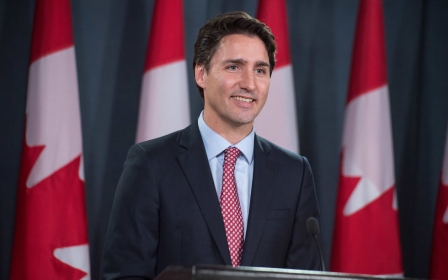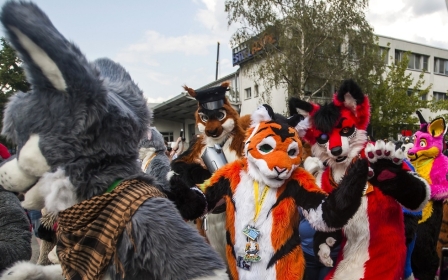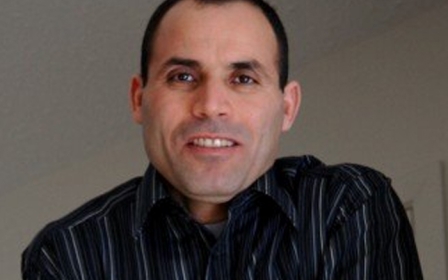Roots revival: Classical Arabic music makes comeback in Canada
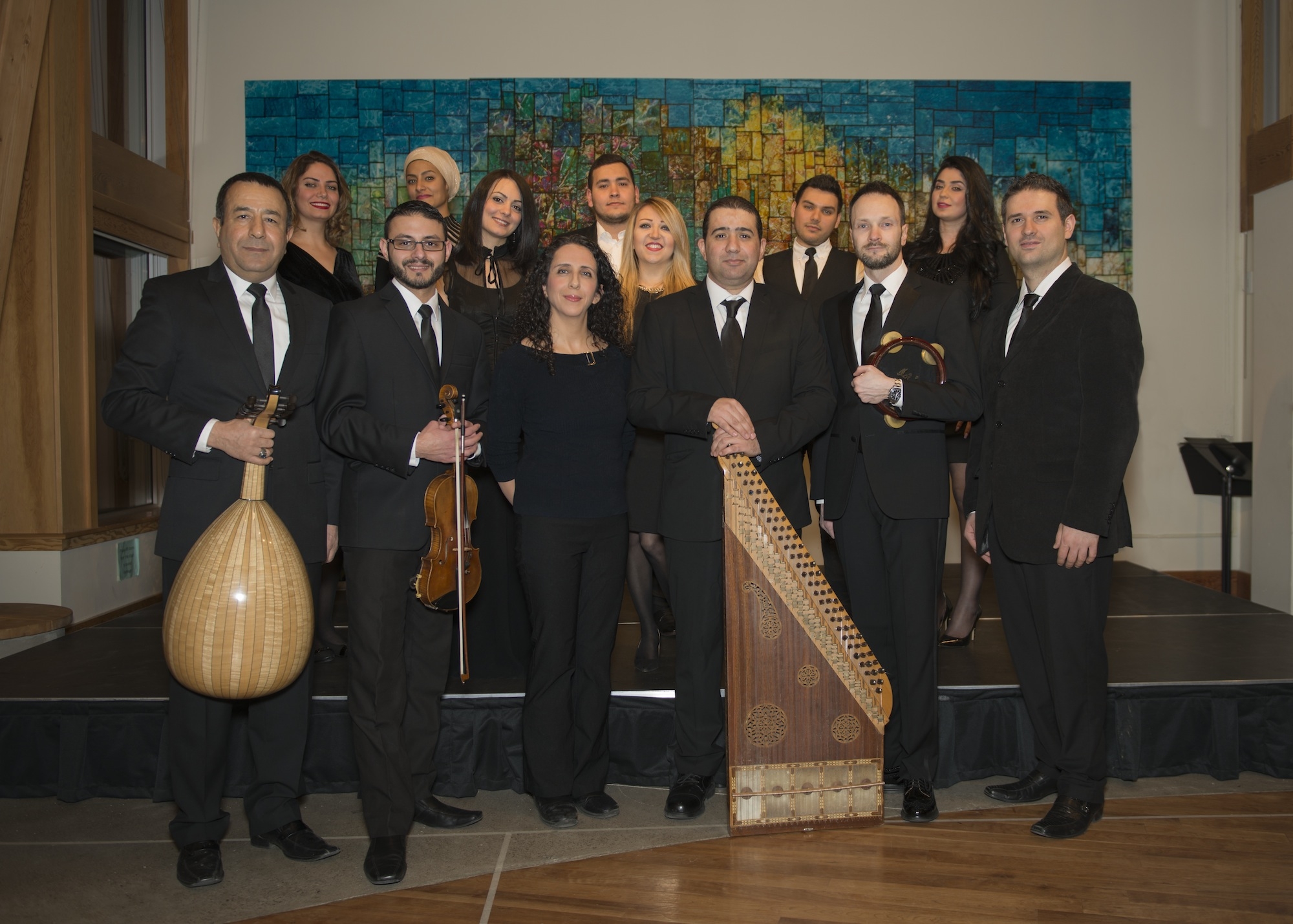
TORONTO, Canada - The music builds slowly and dramatically, as familiar notes and rhythms first made popular by classical musicians from the Arab world blend seamlessly through the air.
Half a dozen musicians play in unison on one side of the brightly lit rehearsal space in Toronto’s west end, while young choral singers stand opposite them, melodically hitting the highs and lows of the Arabic lyrics.
This is the Canadian Arabic Orchestra.
“People have a thirst and need for this kind of music,” said Lamees Audeh, a Palestinian-Canadian who co-founded the group with her husband, Wafa al-Zaghal, in 2013.
Audeh, a pianist, and al-Zaghal, who plays the qanun, a string instrument popular across the Middle East, performed together in Palestine for several years before moving back to Canada with their three children.
Almost immediately, Audeh said she began pestering her husband, who is originally from Jerusalem, to start performing again – but this time, for a diverse Canadian audience.
So far, the response has been overwhelmingly positive.
“Arabic music [represents] a really rich culture… With everything that's happening around the world, in the Arab world and especially the Muslim world, people are really excited to learn about this culture,” al-Zaghal said.
“They have lots of problems, but…” he continued, before Audeh jumped in to finish his sentence, laughing, “they have nice music.”
‘Bringing people together’
Audeh and al-Zaghal founded the Canadian Arabic Ensemble in 2013 after they connected to Toronto-based musicians through a combination of word-of-mouth and good fortune.
In April 2015, they registered the Canadian Arabic Orchestra as a non-profit organisation, making it the only orchestra devoted to classical Arabic music in Canada, and an accompanying choir was born a few months later.
Today, the orchestra is composed of seven musicians, who each play a mixture of Arabic and Western instruments, including violin, cello, piano, qanun, oud, and percussion instruments like the riq, an Arabic-style tambourine.
“Drumming is a key instrument that crosses all borders, all cultures,” explained James Freeman, a Canadian orchestra musician who plays percussion in the group.
“If you’re listening to melodies of a different style or a different culture’s music, it can feel very foreign, but the drumming really is a common language. You may not completely understand it, but you can really feel it.”
The orchestra performs a new show every two months, generally hosting concerts in Toronto and the nearby city of Mississauga, which is home to a large Arabic-speaking community.
Last November, the orchestra performed “Memories,” a show devoted to songs composed by Egyptian poet and songwriter Ahmed Rami and performed by legendary Egyptian singer Umm Kulthum.
A performance in September, meanwhile, zeroed in on songs about cities across the Arab world that celebrated Lebanese artist Fairouz sang about, including Beirut, Damascus, Amman, Mecca and Jerusalem.
“We chose cities because we tried to bring as many people together as possible,” Audeh said. “One main thing that we always think of [is] bringing people together,” al-Zaghal added.
The orchestra’s next shows – March 18 in Toronto and March 19 in Mississauga – are called Mwashahat wa Qudood.
Mwashahat are Arabic poems made popular in Andalusia, Spain, about 1,000 years ago. They are free flowing and follow the rhythms of the accompanying music, Audeh explained. Inspired by the mwashahat but simpler in form and style, Qudood were popular in 18th century Syria.
Packed-out concert halls
Al-Zaghal said he has received requests from people in Montreal, Calgary, Edmonton and even British Columbia, inviting the orchestra to perform in their cities.
“There was a lady, she was very angry. She said, ‘In Montreal, also we have an Arabic community, why don’t you come here?’ It’s a matter of time… we really are trying to go there,” he told her apologetically.
Freeman said the group even changed venues in Toronto to accommodate a growing audience, and was forced to turn would-be concertgoers away due to a lack of space at a recent show in Mississauga.
“Being a start-up ensemble, especially in the fine arts, usually your biggest challenge is getting to the audience and finding an audience to fill your seats. Our biggest challenge now is finding enough seats for all these people,” Freeman said.
“It’s really a chance for them to reconnect with their soul,” he said about the audience, which is largely composed of older and newer generations of Arab immigrants to Canada. “Sometimes they may not even know what to expect until they actually hear us and feel the music with us. It’s a really collective, uplifting experience.”
The orchestra has been asked to perform on opening night at this summer’s Stratford Festival, a prestigious theatre festival held annually in Stratford, Ontario. The group members also have ambitious plans to one day act as a hub for classical Arabic music education and performances in North America.
“When we came to Canada, it was me nagging Wafa, ‘When are we going to do a concert? We have to do a concert. We have to do something together.’ That was the beginning of something that I didn’t think would get so big,” Audeh said.
Shattering stereotypes
But for now, the orchestra is happy just reaching as many people as it can, from Arab-Canadians and new immigrants who know and love the songs already, to Canadians who may have no familiarity with Arabic music at all.
“I want them to get the message that Arabs are not what they see in the news. We have very rich music, a very rich culture. It’s a nice message regarding the real nature of Arabs and the Middle Eastern community,” al-Zaghal said.
He said he hopes the orchestra can also instill a sense of pride among Arabs in Canada. “For me, I want them to really feel honoured that they have this rich culture,” he said.
“Classical Arabic music is going down the drain even in parts of the Arab world,” Audeh added. “Bringing it back to life in a place like Canada I believe is something to be very proud of.”
New MEE newsletter: Jerusalem Dispatch
Sign up to get the latest insights and analysis on Israel-Palestine, alongside Turkey Unpacked and other MEE newsletters
Middle East Eye delivers independent and unrivalled coverage and analysis of the Middle East, North Africa and beyond. To learn more about republishing this content and the associated fees, please fill out this form. More about MEE can be found here.


